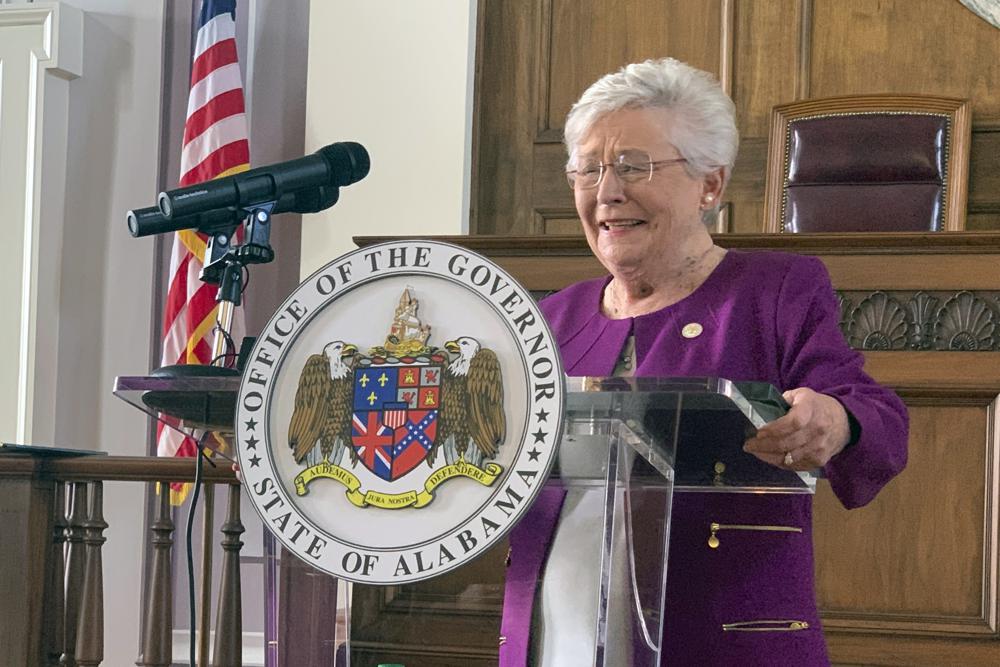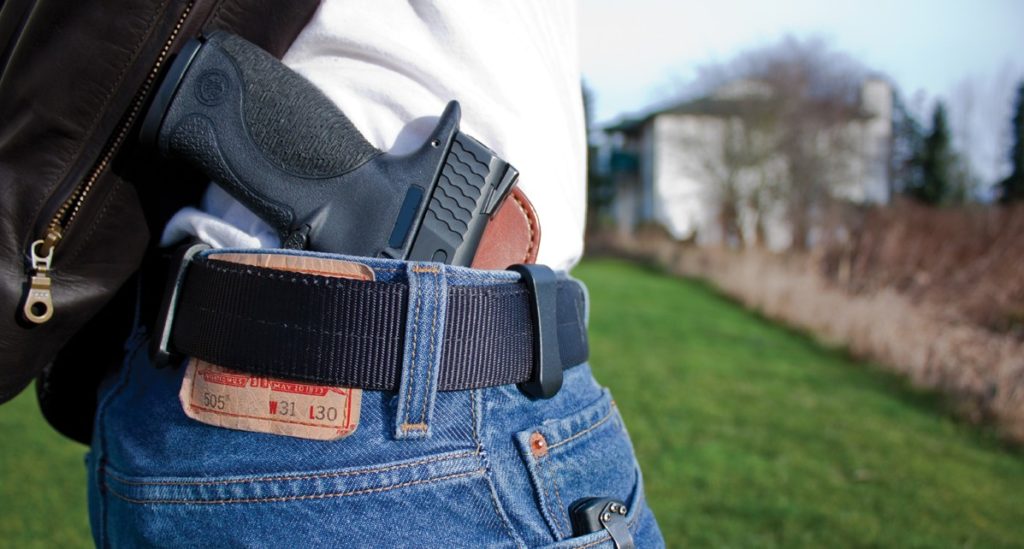Alabama won’t require background checks for concealed guns

Alabama will become the latest state to allow people to carry concealed handguns without first undergoing a background check and getting a state permit. Alabama Gov. Kay Ivey signed the measure into law Thursday shortly after it was approved by state lawmakers. The new law, which takes effect January 1, will end the requirement for a person to get a concealed carry permit to carry a loaded handgun concealed under their clothes, in a car, or in a purse or bag. “Unlike states who are doing everything in their power to make it harder for law-abiding citizens, Alabama is reaffirming our commitment to defending our Second Amendment rights. I have always stood up for the rights of law-abiding gun owners, and I am proud to do that again today,” Ivey said in a statement. The legislation is championed by gun rights advocates who call it “constitutional carry,” in reference to the Second Amendment right to keep and bear arms. Opponents, including state sheriffs and others in law enforcement, said the permits help combat crime and enhance public safety. Paula Wilson, a volunteer with the Alabama chapter of Moms Demand Action, called the legislation “reckless” and said the politicians who supported it “have chosen the gun lobby over law enforcement and public safety.” “They want you to believe that they’re standing up for law-abiding gun owners, but don’t let them fool you. They’ve done the exact opposite — putting our families, communities, and first responders at greater risk,” Wilson said in a statement. There are 21 states that allow concealed weapons in public without a permit. The Alabama House of Representatives voted 70-29 for the bill approved by a conference committee. The Alabama Senate voted 24-6. “I don’t think that just because you own a firearm that you should have to pay a tax, or a fee, to carry it,” GOP Rep. Shane Stringer, the legislation’s sponsor, said. The bill does not do away with concealed carry permits, and Stringer said he thinks many people will still get them voluntarily. “You are making it easier for the lawless,” Rep. Thomas Jackson, a Democrat from Thomasville, told Stringer during the debate. Opponents have pointed to the state’s already high rate of gun violence. Alabama in 2020 had the country’s fifth-highest rate of gun-related deaths – including suicides and murders — with 1,141 deaths, according to numbers from the Centers for Disease Control and Prevention. The Alabama Sheriffs’ Association opposed the bill. During public hearings, law enforcement officials said the permits are a tool officers use daily to remove weapons from the hands of individuals who should not have them in the first place. A new state database is under development to help officers flag people who are prohibited from possessing a handgun. Stringer, a former captain in the Mobile County sheriff’s department, said he believes that will be a better system to catch people who should not have handguns. The president of the Alabama Sheriffs’ Association has said he does not think the database will effectively replace the safety checks provided by the permits because of inevitable gaps in data collection. Lawmakers made several changes to the bill to try to alleviate some of law enforcement’s concerns. During a traffic stop or other investigation, an officer who has a reasonable suspicion that a person was about to engage in criminal conduct could temporarily take a handgun and run it through databases to see if the gun was stolen. The officer could also check the person’s criminal history. An officer could also temporarily take a weapon if a reasonable person would believe it is necessary for the safety of the officer or others, but it must be returned unless there is an arrest or the person is posing a safety threat. The legislation would steer up to $5 million in state funds to sheriffs’ offices to compensate for the funding loss from permit fees. Republished with the permission of the Associated Press.
Alabama Sheriffs Association comes under fire for opposition of new gun legislation

Alabama Sheriffs Association (ASA) director Robert ‘Bobby’ Timmons is coming under fire for his recent commentary on the new constitutional carry bills that have been set for debate in the Alabama legislature this year. There are currently three bills that have been pre-filed in the Alabama House and Senate that would legalize permitless or “Constitutional Carry” in the state. This means citizens would be able to legally carry handguns without having to purchase a permit from their local Sheriff’s office. In a recent 1819 report, Timmons was asked about his views on the Second Amendment, and Timmons commented that he believes that the amendment wasn’t meant to allow citizens to carry a concealed weapon. He believes the Second Amendment was written to allow citizens to defend their homes. When asked if ASA would support amending the Constitution to limit the Second Amendment to only allowing firearms for the defense of a person’s home, Timmons told 1819, “Oh yeah. I’d be in favor of that. But, I mean, it would never get passed.” Timmons argued that gun permits are a matter of public safety. He commented, “Absolutely without question for public safety just like a driver’s license, you need a driver’s license. If you don’t have a license, you can’t drive. If you don’t have a permit, you can’t carry a concealed gun.” When asked if permits were a revenue stream for Alabama Sheriffs, Timmons agreed, stating, “It buys ammo, vehicles, and bulletproof vests. If you get rid of the permits, the taxpayers will have to pick up the bill.” The National Association for Gun Rights (NAGR) has criticized the ASA for its opposition to Constitutional carry. Shane Stringer introduced one of the bills currently being considered. Stringer argued that some sheriffs are trying to hold onto the fees, but said people shouldn’t have to pay to exercise a constitutional right. “I don’t think we should be taxing people for carrying a gun,” Stringer said. “I am a firm believer that law-abiding citizens should not be punished and forced to get a permit to carry a firearm when the criminal element is not.”
Enjoying leftovers: Sheriffs feed inmates, keep extra cash

In Alabama, the less sheriffs spend on feeding inmates, the more money they get to put in their pockets. For decades, sheriffs have made extra money – sometimes hundreds of thousands of dollars – under a Depression-era system by feeding prisoners for only pennies per meal. Critics say the meals can be unhealthy, and a lawsuit against dozens of sheriffs combined with media reports about the practice threaten to end the one-of-a-kind system. Legislators this year approved potential changes that would prevent sheriffs in two counties from keeping the excess money — including one where a former sheriff was jailed after feeding prisoners corndogs while pocketing more than $200,000 — and wider change is possible. “I think everyone agrees that something needs to be done,” said Sonny Brasfield, executive director of the Association of County Commissions of Alabama. Republican Sen. Arthur Orr said he is working on a bill to abolish the practice. “This law is from the 1930s. Times change. It’s time we move on into the 21st century,” said Orr. Back when chain gangs were common in the late 1920s, Alabama passed a law that gave sheriffs $1.75 a day from the state to feed each prisoner, and sheriffs got to pocket anything that was left over. Jails in most of Alabama’s 67 counties remain on the system generations later. Sheriffs also get small payments from the state per jail. Some also receive payments from cities and the federal government for holding prisoners, further boosting income. Add up all the money and a dash of frugality, like purchasing low-cost grub and accepting donated food, and sheriffs can wind up with large profits from jailhouse kitchens. Attorney Aaron Littman, who helped sue earlier this year trying to find out how much sheriffs are making off jail food, said lawyers regularly hear complaints about poor living conditions and lousy food in jails. “It’s no way to run government,” said Littman, of the Atlanta-based Southern Center for Human Rights. Alabama is the only state with such a setup, he said. Littman questions the legality of sheriffs pocketing the money. The Southern Center, which advocates for change in the criminal justice system, sued with the nonprofit Alabama Appleseed for Law and Justice in January to make 49 sheriffs release information that would show how much they are making off jail food. Sheriffs have refused, arguing in court that the numbers are personal and private. Some of the amounts have been revealed. Monroe County Sheriff Tom Tate collected “excess” jail feeding funds of $110,458 over three years ending in 2016 — a tidy amount for a south Alabama county with only 22,000 residents and a median family income estimated at $42,335 annually by the Census Bureau, according to an accounting turned over to a plaintiff’s lawyer. In mid-sized Etowah County, where the jail holds 900 people on average, Sheriff Todd Entrekin recently released tax forms showing he made a profit of $672,392 from the jail kitchen in 2015 and 2016. Entrekin made the documents public during a news conference where he denied malnourishing prisoners and denied news reports linking food profits and a beach condominium he and his wife purchased for $740,000 last year. “Nobody here is underfed. Nobody here is mistreated. I will say it’s not the Ritz, so you won’t be treated like a king. You will be treated like someone who has broken the law, which means you won’t get your choice about what or when you eat,” Entrekin told reporters. Last year, a federal judge held Morgan County Sheriff Ana Franklin in contempt and fined her $1,000 because she took $160,000 from a jail food account. She used to make a personal car loan that later failed, court documents showed. The judge ruled Franklin’s actions violated an agreement reached by former Morgan County Sheriff Greg Bartlett, who was briefly held in his own jail in 2009 after a federal judge held him in contempt for feeding skimpy meals to boost his profit, which Bartlett said was $212,000 over three years. Bartlett went in with another sheriff to purchase a truckload of corndogs for $1,000 and fed them to prisoners for weeks, evidence showed. Franklin argued she wasn’t bound by Bartlett’s agreement, but a court disagreed. Sheriffs in Morgan and neighboring Cullman County in coming years would be required to spend any excess food money on police needs under proposed constitutional amendments approved this year by lawmakers, but voters still must OK the measures. It’s unclear how much is at stake since they, like most other sheriffs, haven’t publicly released detailed information about their operations. Sheriffs’ responses to the suit seeking financial information have been coordinated in part by the Alabama Sheriff’s Association, where longtime executive director Bobby Timmons did not return a message seeking comment. Republished with the permission of the Associated Press.
State Senate to vote on nixing concealed carry permits

The Alabama Senate will vote on a legislation Tuesday that would allow people to lawfully carry a concealed handgun without needing to get a permit first. Senate Bill 24, sponsored by Tuscaloosa-Republican state Rep. Gerald Allen, would remove restrictions on Second Amendment rights and would codify constitutional carry as the law of the land. The bill however, has been heavily criticized by some of the state’s law enforcement officials, including the Alabama Sheriff’s Association and the Alabama County Commissioners Association, who say concealed carry permits are necessary for public safety. “It’s a bad piece of legislation. It’s probably one of the worst we’ve seen,” Butler County Sheriff Kenny Harden told AlabamaNews.net. Concealed carry permits are typically only granted should an individual pass a background check. SB24 would in essence allow anyone who has previously failed a background check and denied a carry permit to carry a gun. But Rep. Allen says the bill is all about the Second Amendment and U.S. Constitution, which he says protects “the right of the people to keep and bear arms” for the “security of a free state.” He doesn’t think Alabamians should be required to pay their hard-earned dollars to exercise those rights. “Alabama should be leading the way on constitutional gun rights. More than ten states across the country already allow their citizens to carry guns without a permit. It’s time we give our citizens the right to bear arms without first seeking the government’s permission,” Allen said. “We already allow open carry without a permit, and there is no logical reason for continuing to require a permit for concealed carry.” The National Rifle Association (NRA) also supports the bill. “The law-abiding citizens of Alabama have a fundamental, constitutional right to keep and bear arms,” said the NRA. “The NRA supports legislation that would provide law-abiding citizens greater freedom to protect themselves in the manner that best suits their needs, while still keeping guns out of the hands of violent criminals.” Senate President Pro Tem Del Marsh said he expects the Republican-controlled Senate to pass the measure Tuesday. According to the Law Center to Prevent Gun Violence, 11 states —Alaska, Arizona, Idaho, Kansas, Maine, Mississippi, Missouri, New Hampshire, Vermont, West Virginia and Wyoming — allow people to carry concealed weapons in public without a permit.
Vote delayed on controversial gun bill

In a committee room filled to the brim with law enforcement officers from across the state, the Senate Judiciary Committee met today to take up a controversial bill from Sen. Gerald Allen (R-Tuscaloosa), which would allow Alabamians to carry a firearm in their vehicle without a concealed carry permit. Before taking up Allen’s bill, the committee renewed discussion on SB67, which would set an interest rate cap of 10 percent on lawsuit lending. The vast majority of opposition centered around Democrats’ insistence that the bill should also address payday lending, which has wreaked havoc on low-income Alabamians. Despite that, the bill garnered a favorable report by a 7 to 4 margin. The next bill up for debate was SB108, which would increase the age of youthful offenders to 23 or 25, depending on the situation, and allow judges the discretion to expunge youthful offender records. The only opposition to the bill came from Sen. Larry Stutts (R-Franklin), who saw no need to increase the age threshold for youthful offenders. “A regular criminal conviction is a lifetime sentence,” said Sen. Hank Sanders (D-Selma) in opposition to Stutts’ statements. “It follows you in getting work, it follows you in voting, it’s a lifetime conviction.” The bill gained a favorable report, as did SB69, which provides standing committees with the right to subpoena documents from state agencies and their contractors. A brief public hearing was held for SB114, a bill sponsored by Rep. Paul Sanford (R-Huntsville) to regulate “fantasy contests” and provide regulations therein and give oversight of the contests to the Attorney General’s Consumer Affairs Division. Joe Godfrey, Executive Director of the Alabama Citizen’s Action Program (ALCAP), and Eric Johnston, an anti-gaming lawyer in the state, both spoke in opposition to the allowance of such games in Alabama. “The argument is that this is not gambling, this is just a game of skill,” Godfrey said. “This is gambling and we need to not legalize this type of gambling in Alabama.” Sen. Vivian Figures (D-Democrat) seemed to chastise the duo for their opposition to the games, even asking Godfrey if he was opposed to church bingo. “The thing about this is that people can already play this in Alabama but Alabama is not getting any money from it,” Figures said. “To me, this bill is about putting it in place so we can reap some of the benefits. God gave all of us free will, so it’s up to us individually to choose.” The bill received a favorable report by a 10 to 2 margin. Next on the agenda was the main event in the eyes of those in attendance, the public hearing for Allen’s guns bill. “If you are for this bill, then you support the Second Amendment,” Allen said before turning discussion over to the public. “If you are not for this bill, then you support gun control.” At that, the over-sized crowd launched into boos and moans. “I sure do support gun control,” Figures shouted out over the hiss of the crowd. Bobby Timmons of the Alabama Sheriffs Association and Barry Cleveland of the Alabama Gun Rights Network both rose to oppose the measure, as well as Lee County Sheriff Jay Jones and Demopolis Police Chief Tommy Reese. “The only thing we’re saying is every time we turn around an officer is being killed just because he’s wearing a badge,” Timmons said. “What is a life worth?” Cleveland opposed the bill on the grounds that it allowed citizens to carry “long guns,” such as an AR15, in vehicles. He noted that if the legislation only allowed for pistols he would be in support of it. Both officers noted the precarious situation law enforcement would be in if every car stopped might be carrying a weapon, with Reese even recounting a time he was fired at by a fleeing offender. “Stand with all of the officers around this state,” Reese said. “Please stand with us, don’t take this from the sheriffs.” Two proponents also spoke up – Eddie Fulmer, president of the gun rights group Bama Carry, and Sonny Brasfield, executive director of the Association of County Commissions of Alabama (ACCA). “The right we want instated is the one taken away from us by your predecessors,” Fulmer said to the committee. “I’m asking you to do what we elected you for and stand with the people.” Once the public hearing was over, Figures called out Fulmer for what she said were “threatening” statements. In response, the crowd offered up a cry of support. Figures continued saying “bring it on,” which brought all of the officers to their feet to give her a standing ovation. “We don’t pay you what you deserve,” Figures said, thanking the officers in attendance. The committee did not move for a vote on the bill and will likely take it up again next week.

